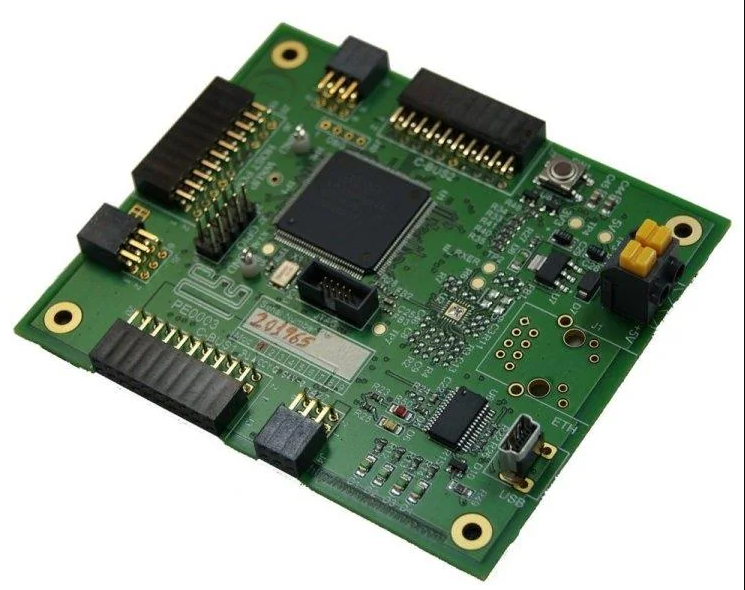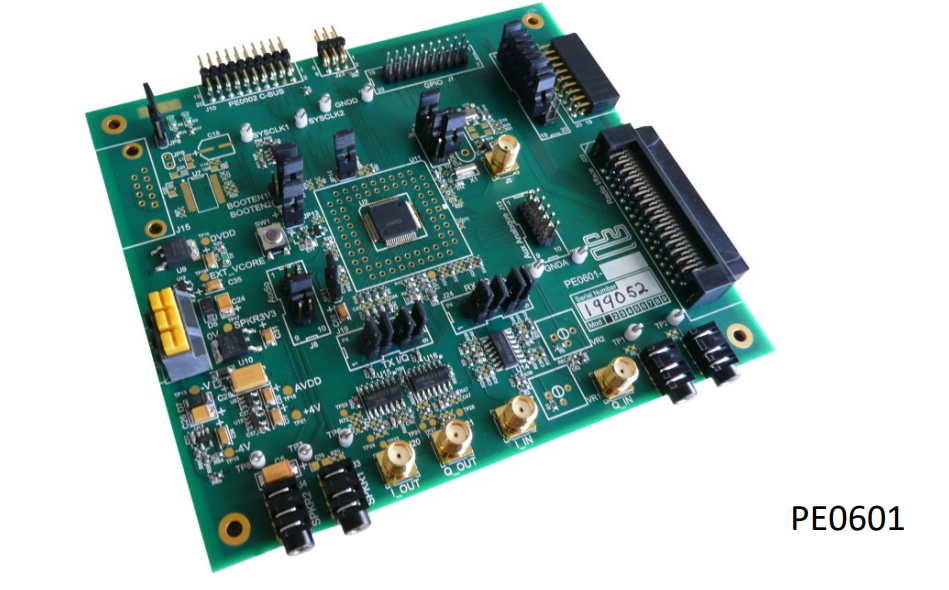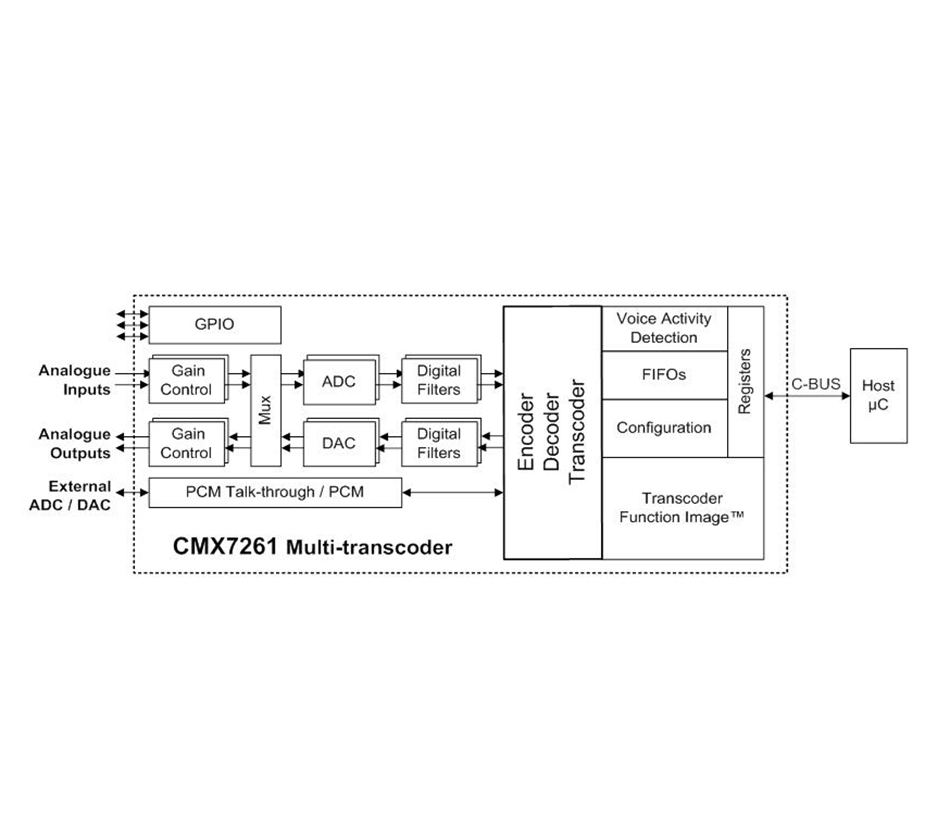Digital Voice
CMX7261 – Voice Multi-transcoder IC
The CMX7261 Multi-transcoder IC is a member of the CML DuraTALK family of digital voice products, providing multiple speech coders and an analogue audio codec in a single chip.
The CMX7261 features voice encoding and decoding through an Analogue Front End or transcoding operations over its digital interfaces.
Input data and control are via an SPI compatible C-BUS which has a write-through ability to manage an external SPI controlled device using only one host SPI interface.
The CMX7261 utilises CML’s proprietary FirmASIC® technology. Sub-systems are configured by a Function Image data file that is uploaded (by the host or an external serial memory) during device initialisation and defining the device’s function and feature set.
Two Function Images are available, these can be downloaded from the CML Technical Portal (contact for access):
- CMX7261 FI-1.x – Multi-transcoder (CVSD/PCM/G729A)
- CMX7261 FI-2.x – PCM/G.723.1 Full Duplex Codec
Devices are available through our Distributor Network.
Features
- No Audio Codec Required
- No DSP nor DSP Skills Required
- Full and Half-duplex Operation
- Encoding, Decoding and Transcoding
- Mutiple Voice Coding Algorithms Supported – Linear PCM – G.711 ( µ-law, A-law) – G.729A – G.723.1 – CVSD
Transcoder Routing:
- Choice of Input Sources: – C-BUS/Host, PCM Codec, Analogue Audio Inputs
- Choice of Output Sources: – C-BUS/Host, PCM Codec, Analogue Audio Outputs
- Voice Activity Detection (VAD)
- C-BUS Host Serial Data/Control Interface – SPI compatible with Register Mapping – Read/Write 128byte FIFOs – Streaming data transfer
- Auxiliary GPIO Functions
- Master/Slave PCM Serial Interface for External Audio Codec
Applications
- Duplex and Half Duplex Digital Radio Systems
- Personal Area Network Voice Links
- Privacy-type Digital Voice Communications
- Wireless PBX
- Voice over IP (VoIP) Applications
- Digital Software Defined Radio (SDR)
Power Supply Requirement
- 3.0 to 3.6 V
Design Resources
There are two Function Images currently available:
7261FI-1.x:
Linear PCM, CVSD and G.729A speech coders
8, 16 and 32 kHz sampling
Packed and unpacked frame formats
µ-law, A-law PCM compression
Voice Activity Detection
7261FI-2.x:
Linear PCM and G.723.1 speech coders
G.723.1 at 5.3kbps and 6.3kbps
8, 16 and 32 kHz sampling
µ-law, A-law compression
DTX function with Voice Activity Detection
Lost Packet Recovery
The device’s functions and features can be enhanced by subsequent Function Image™ releases, simplifying in-the-field upgrades.
CMX7261 FAQ
Q. Should pull-up or pull-down resistors be connected to CMX7261 device GPIO pins (GPIOA, GPIOB, GPIOC, and GPIOD)?
A. The CMX7261 features flexible GPIO pins that can be independently configured via C-BUS serial interface commands to operate in one of the following modes: CMOS digital output, CMOS digital input or CMOS digital input with bus hold. Bus hold automatically engages a 75kohm internal pull-up or pull-down resistor that reinforces the current logic state of the input signal. As is normally the case, the state of a CMOS digital input will be indeterminate and may increase device supply current when the input’s voltage is not at valid ‘0’ or ‘1’, i.e. when the node voltage is “floating.” When the CMX7261 is RESET (by asserting its RESETN pin, issuing a C-BUS General RESET or by triggering an internal power on reset) all its GPIO pins are immediately placed in CMOS digital input mode. Any GPIO pins not being pulled either up or down by an external load will be floating. Once a Function Image™ is loaded into the device then all its GPIO pins are placed in CMOS digital input with bus hold. If user circuits require one or more GPIO pins to be held at a deterministic ’0’ or ‘1’, i.e. not floating after RESET and before the Function Image™ is loaded then that circuit should connect external pull-up or pull-down circuits to such pins.
| PE0003 |  |
The PE0003 Evaluation Kit Interface Card is a global interface system for use with evaluation kits for CML’s new generation ICs, including FirmASIC™ based products. This greatly simplifies the approach to the evaluation and design-in process. | PE0003_Product_Page |
| PE0601-7261 |  |
The PE0601 Platform Evaluation Kit is designed to assist in the evaluation and application development of the CMX7x6x range of FirmASIC products. |
CVSD white paper
CVSD white paper - Adaptive Delta Modulation
C-BUS Guides
Guides to operation and interfacing
PE0601-7261-7262 Board Schematics
PE0601-7261-7262BoardSchematics
EF0601-M25P10-10-7261.h
CMX7261 Thick Stub
Download
C Project files
These are written and compiled using the LPCXpresso toolchain. Each C project contains all the required source, a Quick Start and a binary that can be run without installing LPCXpresso. For a more comprehensive introduction, click the link.
PR7261_FI1.x C Project
The complete C project for the CMX7261. Requires the PE0003 Universal Interface Card, the PE0601-CMX7261 Evaluation Kit and the EC0003 GUI for user interaction. Version 1
PR7261_FI1.x Quick Start
A guide to setting up a PE0003 Universal Interface Card and PE0601-7261 Evaluation Kit for fast, initial evaluation of the CMX7261 FI1.x. Requires the EC0003 GUI for user interaction. Version 2
PR7261_FI1.x C binary
A pre-compiled binary for CMX7261 FI1.x evaluation using the PE0003 Universal Interface Card and PE0601-7261 Evaluation Kit. Requires the EC0003 GUI for user interaction. Version 1
PR7261_FI2.x C Project
The complete C project for the CMX7261 using FI2.x. Requires the PE0003 Universal Interface Card, the PE0601-CMX7261 Evaluation Kit and the EC0003 GUI for user interaction. Version 1
PR7261_FI2.x Quick Start
A guide to setting up a PE0003 Universal Interface Card and PE0601-7261 Evaluation Kit for fast, initial evaluation of the CMX7261 FI2.x. Requires the EC0003 GUI for user interaction. Version 2
PR7261_FI2.x C binary
A pre-compiled binary for CMX7261 FI2.x evaluation using the PE0003 Universal Interface Card and PE0601-7261 Evaluation Kit. Requires the EC0003 GUI for user interaction. Version 1

